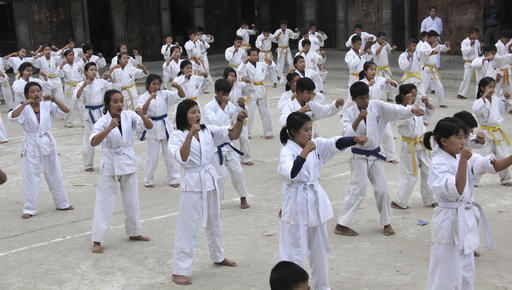
In this Nov. 29, 2016, photo, internally displaced girls in Jeyang village camp, near the border with China, join the karate training for self-defense in Kachin state, Myanmar. Forced from their homes and in some cases torn from their families, young girls and women at a refugee camp in Myanmar’s Kachin state are studying karate to help protect themselves from a known threat: the country’s own military. AP Photo
JE YANG, Myanmar— Every afternoon, dozens of teenage girls at the school for displaced children line up on the grounds, dressed in white uniforms with belts of various colors: yellow, blue, white. They kick high and jump with glee before settling into their exercises, shouting in Japanese as they punch into the air.
The reason many of these girls are in this class is sobering: They want protection from their own country’s military.
Mostly between 13 and 16, they have lost their homes, and in some cases their families, to the long-running civil war in Myanmar’s Kachin state — a war in which soldiers have been repeatedly accused of raping girls and women, but rarely prosecuted. This karate class offers some small sense of power to the vulnerable.
“For all the girls, we teach them how to protect themselves when someone tries to sexually assault them and how to fight back,” instructor Hkun Naw said. “Basically teaching the girls to make themselves safe.
“We wanted to make sure all the internally displaced children have the right to do something that gives them joy, and to be confident.”
More than 100,000 people in Kachin state, in Myanmar’s north, have been forced from their homes by fighting between government troops and ethnic Kachin rebels who have sought greater autonomy for decades. A 17-year-long cease-fire ended in 2011.
Je Yang is among the most crowded camps, with more than 8,000 people, including 16-year-old Hkawn Ra. She fled fighting in her village of Man Dung while she was at school five years ago, when she was 11. She has not seen her parents since.
She once dreamed of becoming a nurse, but no longer. “Because of the political situation and civil war, I cannot become who I want to be, and I am not angry about it anymore,” she said.
Hkawn Ra is, however, learning karate, after hearing about rapes and sexual violence against women in the region. A community-based organization operating under the Kachin Independence Organization has held karate classes in Kachin-controlled areas since the year the cease-fire ended, seeking to teach girls and boys self-defense and self-confidence.
“They (the military) rape women and that’s why I was interested, and decided to learn karate to protect myself at least,” Hkawn Ra said.
Women organizations say the military has been long using rape as weapon of war. The Women’s League of Burma says it has documented more than 100 cases of rape and sexual violence against ethnic women by the military army since 2010. The government and the military have remained largely silent on the issue.
This fall, Muslim Rohingya and rights groups have said soldiers and police have repeatedly raped members of the ethnic minority in northwestern Rakhine state. Authorities have been conducting sweeps of the region since October, when nine border guards were killed by unknown attackers. The government has blocked foreign media from the area, but Rohingya who fled to nearby Bangladesh report rapes and murders by security forces, and satellite images back up their claims of village-burning. At a recent press conference, military spokesman Soe Naing Oo denied that soldiers in Rakhine were committing any human-rights violations or sexual violence.
READ: Alleged rapes spur Rohingya upheaval in Indonesia camp
The Kachin Women’s Association of Thailand and the Legal Aid Network last year released a report on investigators’ lack of progress in the brutal 2015 rape and murder of the two Kachin volunteer teachers. Dozens of soldiers were housed closed to the rape scene, and several left shortly before the bodies were discovered, but no suspects have been identified.
Prosecutions have been few. In 2014, a soldier was sentenced to 7 years in prison for raping a 7-year-old Kachin girl in northern Shan state. Accused Myanmar soldiers normally face a military tribunal, but in that case lawyers successfully pressed for a civilian trial.
Ethnic minorities overwhelmingly voted for Aung San Suu Kyi’s National League for Democracy last year, helping it replace an elected but military-dominated government. But many are now disappointed with her government’s efforts to resolve a host of ethnic conflicts and what they see as the military’s impunity.
“Without talking about human-rights violations and ignoring the truth and justice for the victims, there won’t be a real peace and national reconciliation in our country,” said Julia Marip, secretary of the Women’s League of Burma.
READ: Asean members scored for lack of compassion for Rohingya refugees
With little confidence that soldiers will be held to account for misdeeds, the girls in the karate class hope to at least deter them from committing any to begin with. They compete with each other, and some have dreams of fighting professionally.
“Our instructor said we can go abroad to learn more skills, and I want to go overseas and be a professional fighter,” said 14-year-old Nu Ja.
“When they know how to defend themselves,” said Hkun Naw, the instructor, “they will be able to protect their families, their people and their country.”